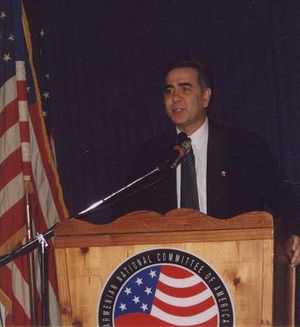
Diasporan political organizations and influential Armenians, in cooperation with the Armenian Foreign Ministry, should launch an international lobbying campaign to block Turkey and Azerbaijan from gaining coveted seats on the United Nations Security Council.
Three years ago, I made a similar plea when Turkey was seeking a seat on the Security Council for the first time since 1961. I urged Armenians worldwide to contact government leaders of their respective countries, requesting that their UN representatives oppose Turkey’s Security Council bid. Regrettably, no such efforts were made and Turkey easily gained a seat on the powerful Security Council for a two-year term (2009 & 2010).
One advantage Armenians have in being scattered throughout the world is their unique opportunity to lobby the governments of dozens of countries on upcoming issues at the UN. Such a strategy would considerably strengthen the Armenian Foreign Ministry’s UN activities. Diaspora’s political clout and contacts would counter the considerable financial resources Turkey and Azerbaijan provide to many countries to obtain their UN votes. As reported by the Eurasia Daily Monitor, Turkey bribed dozens of third world countries in its successful bid for a Security Council seat in 2009. The Turkish government went as far as contributing $20 million to a number of small nations to pay off their UN membership dues, so they won’t lose their voting rights!
Encouraged by the results of its previous campaign, Turkey just announced its candidacy for yet another term on the Security Council in 2015-2016, competing with Spain and New Zealand for two open regional seats. Both of these countries are far more qualified than Turkey in terms of fulfilling Security Council’s objectives of contributing to international peace and security. Having just served for two years on the Security Council after the absence of a half-century, Turkey’s hegemonic appetite is now whetted to return to the Council in 5 years, much earlier than its turn!
For those familiar with Turkey’s long record of human rights violations, repeated massacres of Kurds, denial of the Armenian Genocide, and occupation of the northern part of Cyprus, it is shocking to read the excuses of the Turkish Foreign Ministry for its new Security Council bid: “Turkey is determined to increase its contributions to international peace, security and prosperity, as well as to further its efforts towards strengthening fundamental principles and values such as human rights, democracy and rule of law.”
Having a seat on the UN Security Council, however, may not always be advantageous for Turkey. Its hypocritical behavior of pretending to be everyone’s best friend risks being exposed, as was the case in 2009-2010 when Turkey was forced to take sides and vote on such thorny issues as the Arab-Israeli conflict and the controversial Iranian nuclear program, antagonizing many of its traditional allies.
While Armenians have a five-year advance notice to effectively plan their lobbying activities against Turkey’s membership bid, they have only three months to obstruct Azerbaijan’s Security Council candidacy in elections to be held this October. According to knowledgeable sources, Azerbaijan’s Foreign Minister Elmar Mammadyarov is globe-trotting to provide financial inducements to dozens of needy countries in return for votes. Mammadyarov urged the Foreign Ministers gathered at the Organization of Islamic Cooperation conference to support Azerbaijan’s first-ever bid for a seat on the Security Council, claiming that his country has a “strong commitment to goals and principles of the UN Charter.”
Given Azerbaijan’s authoritarian regime as documented by the State Department and other human rights organizations, in particular its lack of democracy, flagrant violations of human rights, and constant threats to use force against the neighboring Republics of Armenia and Nagorno-Karabagh (Artsakh), it is hard to imagine a country less qualified to serve on the UN Security Council.
Since Azerbaijan will be competing with Slovenia and Hungary for a Security Council seat, one would think that Baku’s chances are close to zero. However, given Azerbaijan’s lavish vote-buying spree funded by abundant petrodollars, Armenians and their supporters need to work hard in the next three months to channel the UN members’ votes towards either Slovenia or Hungary, and away from Azerbaijan.
In countering Turkish and Azerbaijani efforts in international organizations, Armenians must be encouraged by the major political setback suffered by Turkey last week, when Armenia and Cyprus blocked the appointment of a Turkish diplomat to the prestigious position of Secretary General of the Organization for Security and Cooperation in Europe (OSCE). The top contenders for that job were Austria’s former Foreign Minister, Ursula Plassnik and Turkey’s Ambassador to Brazil, Ersin Ercin. By blocking Austria’s candidate, Turkey caused a serious diplomatic rift between the two countries. At the end, Ambassador Lamberto Zannier of Italy was unanimously chosen as OSCE’s new Secretary General.
Armenia and Cyprus must be congratulated for not caving in to Turkish pressures and standing up in defense of their national interests.


Leave a Reply